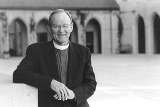
United Religions Initiative
Encyclopedia
The United Religions Initiative (URI) is an international, grassroots, interfaith bridge-building organization modeled after the United Nations
. It aims to create social change by promoting "enduring, daily interfaith
cooperation," ending "religiously motivated violence
", and promoting "cultures of peace
, justice, and healing for the Earth and all living beings."
Guided by the vision of founder The Rt. Rev. William E. Swing
the URI Charter was developed through a series of international conferences and consultation with transformative organizational design practitioners David Cooperrider
and Diana Whitney. The URI Charter was signed by more than two-hundred people present, and hundreds more joining over the Internet, at a ceremony in Pittsburgh, Pennsylvania, USA on June 26, 2000.
Examples of global and member initiatives documented in the public record:
United Nations
The United Nations is an international organization whose stated aims are facilitating cooperation in international law, international security, economic development, social progress, human rights, and achievement of world peace...
. It aims to create social change by promoting "enduring, daily interfaith
Interfaith
The term interfaith dialogue refers to cooperative, constructive and positive interaction between people of different religious traditions and/or spiritual or humanistic beliefs, at both the individual and institutional levels...
cooperation," ending "religiously motivated violence
Religious violence
Religious violence is a term that covers all phenomena where religion, in any of its forms, is either the subject or object of violent behaviour. Religious violence is, specifically, violence that is motivated by or in reaction to religious precepts, texts or doctrines...
", and promoting "cultures of peace
Culture of peace
*Peace, a state of harmony or the absence of hostility.*International Year for the Culture of Peace*Decade for the Promotion of a Culture of Peace and Non-Violence for the Children of the World...
, justice, and healing for the Earth and all living beings."
Guided by the vision of founder The Rt. Rev. William E. Swing
William E. Swing
William Edwin Swing is a retired bishop of the Episcopal Church in the United States. He was the Bishop of California, based in San Francisco, from 1980 to 2006....
the URI Charter was developed through a series of international conferences and consultation with transformative organizational design practitioners David Cooperrider
David Cooperrider
David Cooperrider is the Fairmount Minerals Professor of Organizational Behavior at the Weatherhead School of Management at Case Western Reserve University, and Faculty Director at the Center for Business as an Agent of World Benefit at Case....
and Diana Whitney. The URI Charter was signed by more than two-hundred people present, and hundreds more joining over the Internet, at a ceremony in Pittsburgh, Pennsylvania, USA on June 26, 2000.
Organizational structure
The URI is composed of 426 Cooperation Circles (CCs) in 72 countries worldwide as of November 2009. CCs are groups of 7 or more individuals representing 3 or more different faiths or spiritual expressions. CC members are all located in one of eight regions or span across multiple regions:- Africa
- Asia
- Europe
- Latin America & the Caribbean
- Middle East & North Africa
- Multi-regional
- North America
- Southeast Asia & the Pacific
Activities
Before the formal charter signing in 2000, URI supporters around the world participated together in a project called "72 Hours for Peace", in which more than 250 local organizations united in projects promoting peace and justice during the turn of the millennium.Examples of global and member initiatives documented in the public record:
- The Acholi Religious Leaders Peace Initiative has played a key role in promoting peace in war-torn northern Uganda. The Ugandan groups are also participants in the Northern Uganda Social Action Fund supported by the World BankWorld BankThe World Bank is an international financial institution that provides loans to developing countries for capital programmes.The World Bank's official goal is the reduction of poverty...
. - Members united in early support of U.S. action to prevent continued atrocies in Darfur through the proposed Darfur Accountability Act of 2005.
- The Interfaith Peace-building Initiative (IPI) "is a peace organization which has been working actively since 2003 to promote interfaith cooperation, a culture of peace, harmony, constructive dialogue and the Golden Rule. It is a nongovernmental peace organization legally registered with the Ministry of Justice in Ethiopia. IPI was established by concerned citizens from different religions here in Ethiopia that strongly believe that religions should play an important role in building trust and promoting a culture of peace, healing and reconciliation."
External links
- United Religions Initiative URI's Homepage
- "URI at Interfaith Studies" URI entry at Interfaith Studies
- "William Swing advises graduates to follow their passions, not someone else’s" Rt. Rev. William E. Swing speech from Stanford Report, June 20, 2007 Stanford UniversityStanford UniversityThe Leland Stanford Junior University, commonly referred to as Stanford University or Stanford, is a private research university on an campus located near Palo Alto, California. It is situated in the northwestern Santa Clara Valley on the San Francisco Peninsula, approximately northwest of San...

